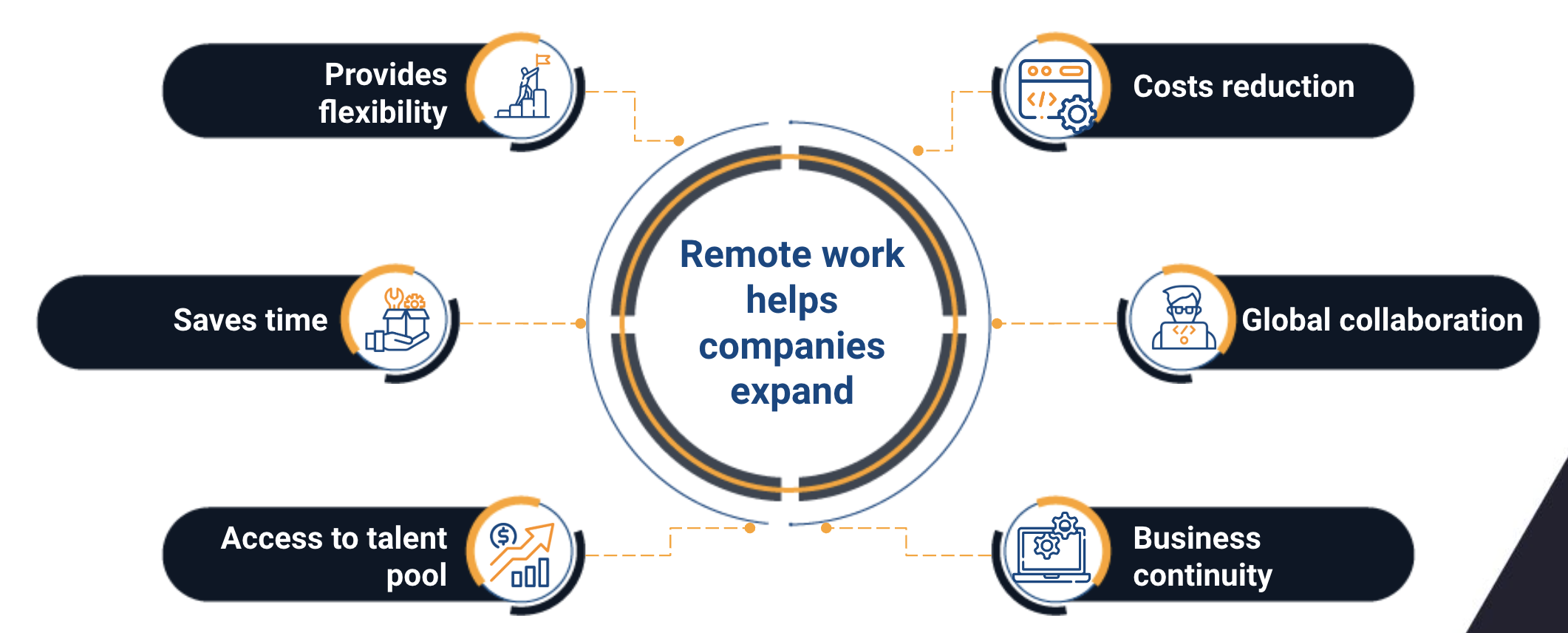
The business world is undergoing a radical transformation driven by remote work and global collaboration. These two phenomena have become fundamental pillars that are allowing companies to expand internationally in ways previously unimaginable.
In this blog, we will explain how remote work and global collaboration are helping businesses expand and thrive in the global market.

Remote work is increasing productivity and efficiency in projects
During the pandemic, remote work actually saved many companies from bankruptcy. With the confinement due to Covid-19, everyone was forced to stay at home to protect their health, so many were able to resume their jobs online without going out.
As the pandemic ended, many companies began asking their employees to return to their offices, but there really is a dilemma regarding productivity and other factors that we will talk about below.
1. Flexibility and productivity in remote work
One of the biggest benefits of remote work is the flexibility it offers employees. Now, professionals are not limited by geographical boundaries and can work from anywhere in the world.
This freedom not only improves the quality of life of employees, but also increases their productivity. Remote workers can adapt their work schedule to their natural rhythms, leading to greater efficiency and creativity at work.
According to a study by Stanford University, people surveyed stated that they are more productive working from home, even more than before the pandemic.
Through technology, the study notes, “we are much better prepared and productivity should continue to improve as technology makes it easier”.
“By spring 2022, remote worker productivity had increased to 9% as companies became more familiar with remote work practices and invested in technology to support it”, they noted in a Forbes article.

2. Time savings
Time is one of the most valuable assets we can count on, since it greatly affects the productivity of a team. And precisely remote work benefits companies a lot in this sense, since they have their team available without delays due to traffic or any unforeseen event on the street that prevents employees from arriving at the office on time.
“The average daily savings in travel time is 72 minutes when working from home,” they noted in a study conducted at the University of Chicago.
3. Access to a global talent pool
Remote work has eliminated geographic restrictions in the search for talent. Companies are no longer limited to hiring local employees; instead, they have access to a vast global talent pool.
This means that companies can find the most qualified and expert professionals in their respective fields no matter where they are located in the world. This diversity in talent drives innovation and improves the quality of work performed.

4. Cost reduction and increased profitability
Remote work has also led to significant cost reductions for businesses. By eliminating the need for physical offices, associated expenses such as rent, utilities, and office supplies are greatly reduced.
Additionally, businesses can opt for independent remote teams, meaning they don't have to pay for additional benefits. This translates into increased profitability and the ability to invest those savings in business growth and expansion.
In an article in Forbes, they cited a survey of 3,000 workers from major companies such as Google, Amazon and Microsoft, and the result was very interesting: 64% “would prefer to work permanently from home rather than a salary increase of $30,000”, since They found remote work very valuable, more than receiving more money in exchange for going to the offices.
5. Global collaboration and market diversification
Global collaboration allows companies to diversify their operations and enter new markets more efficiently. Intercultural and multilingual work teams can better understand the needs and expectations of the local market, which facilitates entry into foreign markets.
Additionally, global collaboration fosters creativity and problem-solving through different cultural perspectives, resulting in more innovative solutions tailored to local needs.

6. Improved business continuity
Remote work and global collaboration also improve business continuity by reducing dependence on a single physical location. Companies can spread their operations and teams across different geographic locations, minimizing the impact of unforeseen events, such as natural disasters or health crises. This geographic diversification ensures that operations can continue even in adverse situations, increasing business resilience.
The remote work modality has become an essential tool for companies seeking to expand in the global market. By providing flexibility, access to global talent, cost reduction, market diversification and improved business continuity, these trends are transforming the way companies operate and grow. Those companies that embrace remote work and global collaboration are in a privileged position to thrive in this increasingly interconnected and globalized world.
Do you need a remote team to develop your next software project? At Rootstack, we have +13 years of experience supporting companies in their digital transformation. Contact us!

